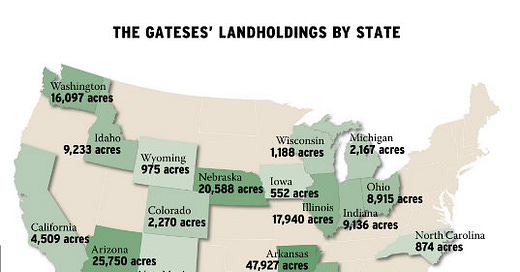After buying a bottle of juice because the papaya and apple combo seemed worth a try, I noticed on the label: “No GMO, No Preservatives, Allergen Free, Casein Free, Gluten Free, Unsweetened, All Glass: BPA/BPS/DEHP Free.” I don't even know what everything means which is why for years I’ve quipped, "You need a PhD to go shopping nowadays," though one can web-search while in the aisle. And typically, a product with less of such stuff . . . costs more; go figure!
After reading the juice label I marveled at how comforted one can feel by all the stuff that's NOT in a product nowadays. And that speaks volumes for how much the corporate colonial commodification racket has messed with if not ruined too much of what some would call the “supply chain” but is actually the intertwining web of the natural world aka Mother Earth. Can we turn the tide, as the Joni Mitchell song encourages: "And we got to get ourselves / Back to the garden".
(map showing Maggie’s, er, Bill Gateses’ farmland)
What's NOT in the juice reminded me of the ancient Egyptian 42 Negative Confessions, which begins:
“Hail, Usekh-nemmt, who comest forth from Anu, I have not committed sin.
Hail, Hept-khet, who comest forth from Kher-aha, I have not committed robbery with violence.
Hail, Fenti, who comest forth from Khemenu, I have not stolen.
Hail, Am-khaibit, who comest forth from Qernet, I have not slain men and women.
Hail, Neha-her, who comest forth from Rasta, I have not stolen grain.
Hail, Ruruti, who comest forth from heaven, I have not purloined offerings.
Hail, Arfi-em-khet, who comest forth from Suat, I have not stolen the property of God.
Hail, Neba, who comest and goest, I have not uttered lies.”
Some readers may detect that as the forerunner ̶ a kinder, gentler version ̶ of the 10 Commandments' “Thou shalt not”s.
At a local town, in a small park adjacent to streets I saw a sign stating, Town Ordinance, in effect: No smoking, vaping, ingesting cannabis, biking, rollerblading, skateboarding, group activities without a permit, etc.
While skateboarders on a sidewalk can be a hazard (especially to the elderly), the overall bent of these examples gets to: What seems lacking historically and in current society is “yes”―this is what you CAN do. It's as if much of the world has been programmed negatively: Thou shalt not, but God loves ya. Don't do this, don't do that... but oh yeah, have a good time.
I think people look to sex, drugs, alcohol, and other highs because they give a quick-fix permission to say “yes.” I don't have a problem with that in conscious moderation, yet when it's at the expense of the deeper long-standing devoted “yes” is where the quick-fix doesn't hold water.
"Hail, Ari-em-ab-f, who comest forth from Tebu, I have never stopped [the flow of] water."
One of the most well-known literary “yes”es is towards the end of James Joyce's Ulysses and in the voice of Molly Bloom whose stream-of-consciousness long sentences are like a river of words and emotions:
“I was a Flower of the mountain yes when I put the rose in my hair like the Andalusian girls used or shall I wear a red yes and how he kissed me under the Moorish wall and I thought well as well him as another and then I asked him with my eyes to ask again yes and then he asked me would I yes to say yes my mountain flower and first I put my arms around him yes and drew him down to me so he could feel my breasts all perfume yes and his heart was going like mad and yes I said yes I will Yes.”
As with a river, “yes” tends to favor a positive flow, a good time, a natural progression of movement, something accomplished: Did you fix the sink? Yes. However, “yes” and “no” are not absolutes, rather contextual answers or statements.
I propose revising “Just Say No” – the 1980s-90s advertising slogan promoted by Nancy Reagan to ward of drug use – so that it applies to unnecessary pipelines, mining, surveillance tracking, genocidal wars . . . The list could go longer.
But it will require more than just saying “no” for systemic changes to happen.
“Just Say Yes” to clean water, clean air, healthy soil, foods that nurture not simply fill, nurturing foods that are available no matter what one’s budget, medicinal herbs that are available no matter what one’s budget . . . The list could go longer.
But it will require more than just saying “yes” for systemic changes to happen.





thanks, Nowick, of course, good question. Seems a case by case basis.
thanks, Peter. And good association; found it: various versions, here are two of Lao Tzu: section 20 "Between "Oh, Certainly!," and "Definitely Not;" how much difference is there? Between beauty and ugliness, how great is the distinction?" and "Is there a difference between yes and no? Is there a difference between good and evil?"